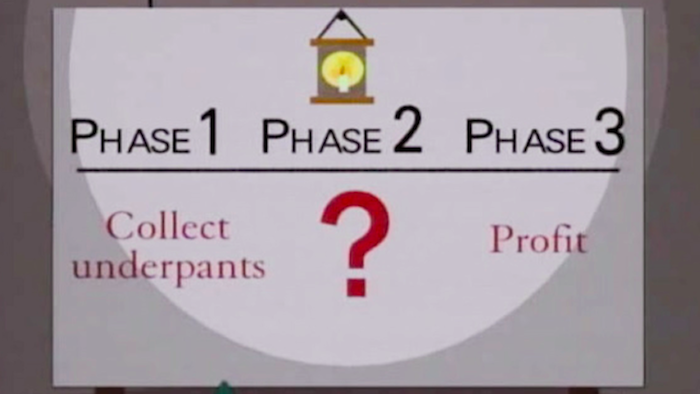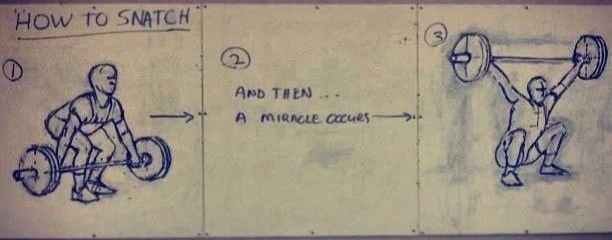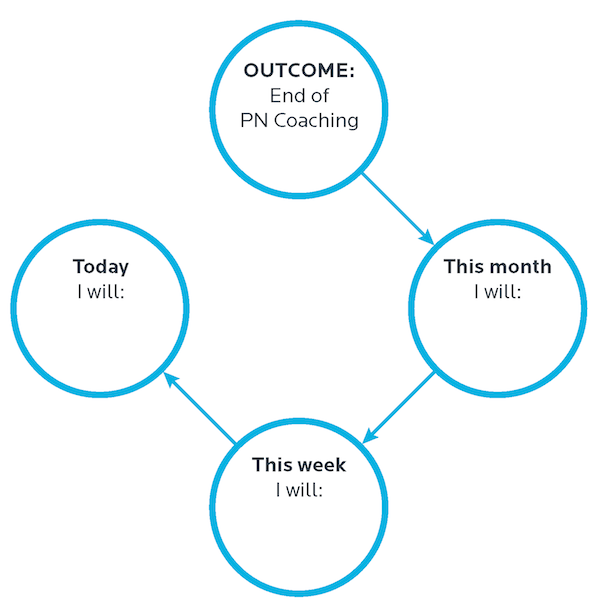The unexpected joy of behaviours
Whether you’re just starting training or an experienced gym veteran, you probably frame your goals in terms of outcomes.
As in what happens at the end of this.
For instance:
- I want to lose X pounds.
- I want to squat / deadlift / bench press / etc. X pounds.
- I want to end up with X% body fat.
- I want to run X miles in Y minutes.
- I want to conquer X challenge.
- I want to get my bloodwork down to X.
And so on.
For many people, this goal setting (or vague wish) is pretty much where the thinking ends.
Which, unfortunately, leads to disappointment. The massive squat doesn’t magically appear; the challenge is not crushed; the molecules of your blood continue their unwanted shenanigans.
Because there is this how piece in between.
It’s often been observed that people treat goals much like South Park’s Underpants Gnomes treat their business model, as follows:

Or like Coach Randy Hauer‘s famous graphic on how to snatch, with a miracle occurring at step 2:

In other words:
People don’t think much about the exact steps they’ll take — and more importantly, repeat consistently — in order to get where they want to go.
But of course, those steps make the going happen.
Now, there are ways to figure out how to get where you want to go.
For instance, one method we use in Precision Nutrition’s Coaching program is a simple 4-circle diagram, like this:

All you have to do is put your endpoint in the top circle, and work backwards.
Let’s say, for example, you want to improve your squat.
That’s your “end of PN Coaching goal”.
Then you ask yourself:
What has to happen this month to work towards that better squat?
Well, perhaps you have to commit to a specific 4-week training plan that focuses on your squat as well as improving any weaknesses in your movement (such as your balance, your posture, your flexibility, etc.).
Then you ask yourself:
What has to happen this week to work towards that better squat?
Perhaps you have to commit to getting your ass to the gym 3 or 4 times this week to work on squat-related things.
Finally, you ask yourself:
What has to happen today to work towards that better squat?
Maybe today you have to call around and find a gym with a trainer who can help you work on your squat.
(And then maybe you realize that a better goal for this week would be to find that new gym, meet your trainer, get acquainted, and simply get started on a training program. Then the week following, you could commit to that gym time.)
And there you go. You have a nice little action plan started.
You can re-visit that action plan literally every single day to update and revise things, iterate, and test how well your plans match your ability to execute.
Every time you re-visit and review that action plan, you can evaluate your data (i.e. “How well did my plan work for me yesterday?”), and then refine your predictions based on data you collect (e.g. “4 days of gym time isn’t workable, but 3 is great, so I’ll make my weekly plan for 3 days/week instead of 4”).
Also, every time you re-visit and review that action plan, you remind yourself that everything is leading to something. You’re not just randomly going to the gym. Everything has a purpose.
When you can see the links between what you do right now and what will happen in the future, you get and stay a lot more motivated.
It feels like even tiny actions are meaningful and important.
Which brings me to the real point of this article:
Tiny actions themselves have unexpected benefits.
What I mean by that is:
First, it’s always better to focus on the quality and consistency of your process than a specific outcome.
The specific outcome will emerge from a quality process done consistently, but it won’t happen the other way around — a specific outcome won’t emerge from a shitty or absent process.
Expecting something good to happen from nothing is basically the virgin birth of fitness. You’ll be waiting a long fucking time.
If you want to improve your squat you have to work on your squat consistently, and make that “working on my squat” process better.
Outcomes flow from quality and repetition.
Second, you’ll discover that the process itself has benefits you didn’t foresee.
In fact, you may even find that you like the other stuff more than your original goal.
Let’s take the example of working on your squat.
So, you’ve worked through your 4-circle exercise, and come up with a variety of actions that you have to repeat to make your squat stronger.
For instance:
- You find yourself a good trainer / coach who is able to write you a program that addresses your individual needs. You meet with this trainer / coach once a week to keep yourself accountable and have them monitor your technique.
- You find yourself a good place to train where they dig squatting and want to help you get better at it.
- You book appointments with yourself in your calendar to hit the gym and put in the work.
- You make sure to eat what you need to build that engine and recover from training: lean protein, fruits and veggies, healthy fats, slow-burning carbs.
- You practice your rehab and mobility work. You do your foam rolling and movement drills.
- You take care of yourself. Occasionally you get a massage or some other soft tissue work. Or you soak in a nice Epsom salts bath at the end of each training day.
And so on.
And let’s say you do all these things consistently for a few months.
Of course, your squat pretty much has to improve from all of this.
But other stuff will get more awesome too.
For instance:
- The trainer you found turns out to be a cool cat. Now you have a new friend and guide in the world of fitness.
You also enjoy the social contact, even if it’s mostly business. You leave your training sessions feeling intellectually and socially energized from your discussions. - The gym you train at turns out to have some other strong people who appreciate a good squat.
They encourage and high-five you. Now you have even more new friends and a sense of community. You have social support and a “tribe”. - Booking appointments with yourself in your calendar helps you develop a sense of purpose and boundaries.
You start to be much more in charge of your time and energy, and much less likely to be an anxious doormat. You develop the habit of planning, preparing, and strategizing around obstacles. You notice yourself scheduling more things, easily re-routing around setbacks, and feeling much more organized. - Eating well boosts your immunity and recovery, improves your blood chemistry, and helps you add some lean mass.
You score A+ on your bone density test, your pants are fitting better (except for your new beauteous squat ass, which you should treasure), you stop getting every virus that comes along, and you have way more energy. - Practicing rehab and mobility heals old injuries and prevents new ones.
The nagging owchies start to disappear, and you start to notice how much more functional and flexible you are. You start to consider taking up other new activities, which you didn’t think you could do before. - Taking care of yourself starts to build the feeling that you are actually worth caring about.
The more you love yourself, the happier you feel, and the more you thrive. You start to feel more creative, compassionate, confident, and calm. You stop hating your body and start focusing on taking better care of it — because you love it and want it to perform even better. You start to respect it, perhaps even consider it rather magnificent. The warm baths make you sleep like a drunken baby.
Well, how about that.
That’s a pretty rad set of benefits. Just from committing to a set of actions that would improve your squat.
Because you practiced the process consistently, you ended up not only meeting your outcome goal (i.e. your squat now kicks ass), you also ended up with all these other amazing things.
That’s the unexpected joy of behaviours.
So here’s what I want you to do.
- Write down your outcome goal — the thing you want to happen.
- Do the 4-circle exercise above — the things that will help you get to your “end of process” goal.
- Whatever you said you should do today, do it.
- Set a reminder to come back tomorrow and review those 4 circles.
- Tomorrow, whatever you say you’re going to do that day to lead towards the outcome, do that.
- Repeat.
- At the end of a week, review. How is your plan working? Based on the data you’ve collected about yourself, does the initial plan need to be refined? If yes, adjust the plan. Then re-commit to doing something that day that will lead to the outcome.
- Repeat steps 1-7.
- At the end of a month, ask yourself:
What’s gotten unintentionally better as a result of focusing on doing these simple process steps consistently?
Look around. What’s better? Where did your process steps lead you to — perhaps places you didn’t expect? - Celebrate. You got more awesome without even realizing it.
At the end of all of this, you may not even give a shit about having a better squat (or whatever your original outcome goal was).
You may enjoy all the other benefits so much that you completely stop caring about what your squat is, and focus instead on how joyful your life has become.
In our PN Coaching program, plenty of people don’t make massive changes to their bodies… but they don’t care, because at the end of a year they feel so fantastic physically, mentally, and emotionally. Somehow, losing another 5 pounds of fat or adding another 5 pounds of muscle just doesn’t quite seem as important as being happier, having better relationships, being a better parent or partner, sleeping better, having more energy, or just feeling great in their own skin.
So:
Build a good process.
Stick to it.
Repeat… and wait for your life to get more awesome.

